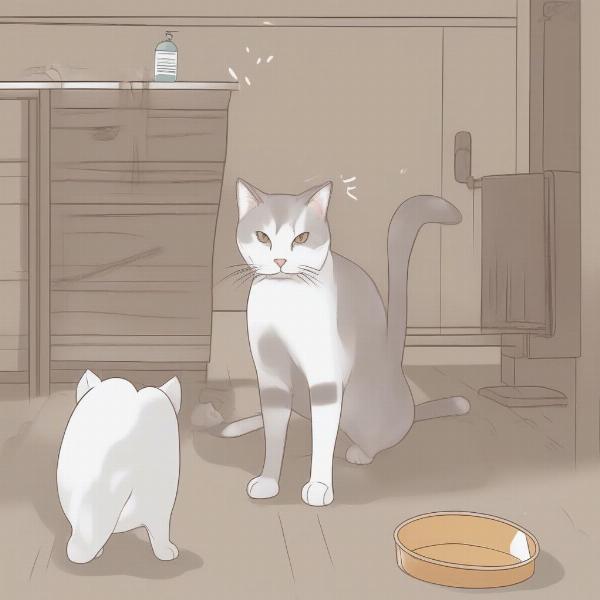Dealing with a cat that insists on peeing on your dog’s bed can be frustrating. This article will help you understand the reasons behind this behavior and provide practical solutions to reclaim your dog’s sleeping space. We’ll explore the possible causes, from medical issues to territorial marking, and offer effective strategies to stop this unwanted habit.
Why is My Cat Peeing on My Dog’s Bed?
Several factors can contribute to a cat peeing on a dog’s bed. It’s crucial to identify the underlying cause to address the issue effectively. Sometimes, it’s a simple matter of preference, with the cat finding the dog bed more comfortable or appealing. Other times, the behavior can stem from more complex reasons such as stress, anxiety, or even medical conditions.
Medical Reasons for Inappropriate Urination
Before tackling behavioral reasons, it’s essential to rule out any underlying medical conditions. Urinary tract infections, bladder stones, kidney disease, and even cognitive decline can cause a cat to urinate outside the litter box. If your cat suddenly starts peeing on your dog’s bed, consult a veterinarian immediately.
Behavioral Reasons for Cat Peeing on Dog’s Bed
Once medical issues are ruled out, it’s time to consider behavioral factors. Stress and anxiety are significant contributors. Changes in the household, such as a new pet or a move, can trigger anxiety in cats. The dog bed might become a target because it smells like the dog, representing security or a familiar scent.
 Cat spraying dog bed to mark territory
Cat spraying dog bed to mark territory
Territorial marking is another common reason. Cats use urine to mark their territory, and the dog bed, especially if it’s in a prominent location, might be perceived as a key territorial marker.
How to Stop a Cat from Peeing on a Dog’s Bed
Addressing this problem involves a multi-pronged approach. First, thoroughly clean the dog bed using an enzymatic cleaner specifically designed for pet urine. This will eliminate the odor and discourage the cat from returning to the same spot.
Next, make your cat’s litter box more appealing. Ensure it’s clean, easily accessible, and located in a quiet area. Experiment with different types of litter to find one your cat prefers. Providing multiple litter boxes, especially in multi-cat households, can also be helpful.
Reducing stress and anxiety is crucial. Create a calm and enriching environment for your cat with plenty of vertical space, scratching posts, and toys. Feliway diffusers or sprays can also help create a more relaxing atmosphere. Consider using a pheromone spray specifically for the dog bed.
If the behavior is related to territorial marking, try to make the dog bed less desirable as a marking spot. Moving it to a less prominent location or covering it with a washable blanket can help. Ensure your cat has plenty of their own spaces to claim, like cat trees or perches.
Conclusion
A cat peeing on a dog’s bed can be a frustrating problem, but with patience and the right approach, you can effectively address it. Remember to rule out medical issues first and then focus on creating a comfortable and stress-free environment for your cat. By addressing the underlying cause and implementing the strategies outlined in this article, you can restore harmony to your household and keep your dog’s bed clean and dry.
FAQ
-
Why does my cat suddenly pee on my dog’s bed? Sudden changes in behavior often warrant a vet visit to rule out medical issues. Stress, anxiety, or territorial marking can also be contributing factors.
-
What’s the best way to clean cat urine from a dog bed? Use an enzymatic cleaner specifically designed for pet urine. These cleaners break down the urine proteins, eliminating the odor that attracts cats back to the same spot.
-
Can Feliway help stop my cat from peeing on my dog’s bed? Feliway diffusers or sprays release synthetic feline pheromones that can help create a more calming and secure environment for your cat, potentially reducing stress-related urination.
-
Should I punish my cat for peeing on my dog’s bed? Punishment is rarely effective and can often worsen the problem by increasing your cat’s anxiety. Focus on positive reinforcement and addressing the underlying cause of the behavior.
-
How can I make my cat’s litter box more appealing? Ensure the litter box is clean, easily accessible, and located in a quiet, low-traffic area. Try different types of litter to find one your cat prefers.
Related Articles
About ILM Dog
ILM Dog is your trusted international resource for all things dog-related. From breed selection and puppy care to senior dog health and training tips, we offer comprehensive and practical advice to help you provide the best possible care for your canine companion. Our expertise covers dog health, training, nutrition, grooming, and product recommendations. If you’re facing challenges with your cat peeing on your dog’s bed or have any other dog-related questions, contact our expert team for personalized guidance. Email: [email protected], Phone: +44 20-3965-8624. Connect with ILM Dog today for expert advice and support.